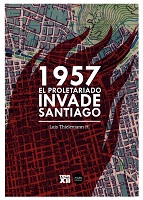1957 El proletariado invade Santiago
| dc.contributor.author | Thielemann, Luis | |
| dc.date.accessioned | 2023-09-26T15:00:02Z | |
| dc.date.available | 2023-09-26T15:00:02Z | |
| dc.date.issued | 2023 | |
| dc.identifier | ONIX_20230926_9789566095835_11 | |
| dc.identifier | OCN: 1401950739 | |
| dc.identifier.uri | https://library.oapen.org/handle/20.500.12657/76389 | |
| dc.language | Spanish | |
| dc.subject.other | Social revolt | |
| dc.subject.other | Social history | |
| dc.subject.other | Santiago de Chile | |
| dc.subject.other | urban proletariat | |
| dc.title | 1957 El proletariado invade Santiago | |
| dc.type | book | |
| oapen.abstract.otherlanguage | In April 1957, a social revolt of unprecedented magnitudes in the history of Chile occurred. The proportion of the population involved was immense, and important parts of the city were seen for hours and even days, outside the control of the State. The dawn of metropolitan Santiago was illuminated with burning barricades, which were nothing more than the signs of street fighting, looting, fires, and finally the flashes of police and military carbines, rifles and machine guns. Six months later, in the southern part of the city, where Santiago was gradually dissolving beyond the Zanjón de La Aguada, thousands of poor homeless families occupied and took over the former La Feria farm, and from there they founded the current town. The victory. Both events are precipitations of complex processes of radicalization and popular politicization. Taken together, the events of 1957 constitute a milestone of rupture and strategic leap in the historical composition of the proletarian universe of Santiago. | |
| oapen.identifier.doi | 10.26448/ae9789566095835.76 | |
| oapen.relation.isPublishedBy | f6cb5ffd-d9ed-409f-b6f8-71eb0272e363 | |
| oapen.relation.isbn | 9789566095835 | |
| oapen.imprint | Ariadna | |
| oapen.pages | 251 | |
| oapen.place.publication | Santiago |

